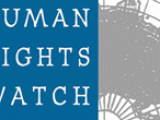The South Caucasus Network of Human Rights Defenders
Human Rights Watch Publishes Annual Report 2011

[26.01.2011]
Human Rights Watch has published its 21st report on human rights situation, covering more than 90 countries and territories worldwide. It reflects extensive investigative work undertaken in 2010 by Human Rights Watch staff, usually in close partnership with domestic human rights activists.
Situation in Armenia, Azerbaijan and Georgia is also reviewed in the report.
Armenia
Events of 2010
Armenian authorities have yet to ensure meaningful investigations into excessive police force during March 2008 clashes in Yerevan, the capital, when opposition supporters protested alleged fraud in the previous month's presidential election. Twelve opposition supporters remain imprisoned following the events.
Torture and ill-treatment in police custody remains a serious problem. Amendments to the Law on Television and Radio threaten to limit media pluralism. Authorities continue to restrict freedom of assembly.
Armenia's international partners did not fully use their leverage to influence the human rights situation. The European Union and Armenia launched negotiations on an association agreement to strengthen ties.
Section on Armenia
Azerbaijan
Events of 2010
Azerbaijan's human rights record remained poor in 2010. The government continued to use criminal defamation and other charges to intimidate and punish journalists expressing dissenting opinions; an outspoken journalist remained in prison on spurious criminal charges, apparently in retaliation for his work. The parliamentary elections of November 7 failed to meet international standards. Other serious problems persisted, including restrictions on freedoms of religion, assembly, and association, and torture and ill-treatment in custody.
The European Court of Human Rights (ECtHR) found Azerbaijan had violated freedom of expression by imprisoning journalist Eynulla Fatullayev and called for his immediate release.
Section on Azerbaijan
Georgia
Events of 2010
Georgia's human rights record remained uneven in 2010. The government evicted hundreds of internally displaced persons (IDPs) from state-owned collective centers in Tbilisi, the capital, often leaving them homeless or without adequate compensation. State actors hindered activists' right to assembly and attacked and harassed journalists and opposition newspapers. Municipal elections on May 30 largely met international standards, but observers also identified significant shortcomings.
More than two years after the August 2008 Georgian-Russian conflict over South Ossetia, the government has not effectively investigated international human rights and humanitarian law violations. Russia strengthened its military presence in and effective control over Georgia's breakaway regions. The European Union started negotiations with Georgia to deepen economic and political ties.
Section on Georgia
Situation in Armenia, Azerbaijan and Georgia is also reviewed in the report.
Armenia
Events of 2010
Armenian authorities have yet to ensure meaningful investigations into excessive police force during March 2008 clashes in Yerevan, the capital, when opposition supporters protested alleged fraud in the previous month's presidential election. Twelve opposition supporters remain imprisoned following the events.
Torture and ill-treatment in police custody remains a serious problem. Amendments to the Law on Television and Radio threaten to limit media pluralism. Authorities continue to restrict freedom of assembly.
Armenia's international partners did not fully use their leverage to influence the human rights situation. The European Union and Armenia launched negotiations on an association agreement to strengthen ties.
Section on Armenia
Azerbaijan
Events of 2010
Azerbaijan's human rights record remained poor in 2010. The government continued to use criminal defamation and other charges to intimidate and punish journalists expressing dissenting opinions; an outspoken journalist remained in prison on spurious criminal charges, apparently in retaliation for his work. The parliamentary elections of November 7 failed to meet international standards. Other serious problems persisted, including restrictions on freedoms of religion, assembly, and association, and torture and ill-treatment in custody.
The European Court of Human Rights (ECtHR) found Azerbaijan had violated freedom of expression by imprisoning journalist Eynulla Fatullayev and called for his immediate release.
Section on Azerbaijan
Georgia
Events of 2010
Georgia's human rights record remained uneven in 2010. The government evicted hundreds of internally displaced persons (IDPs) from state-owned collective centers in Tbilisi, the capital, often leaving them homeless or without adequate compensation. State actors hindered activists' right to assembly and attacked and harassed journalists and opposition newspapers. Municipal elections on May 30 largely met international standards, but observers also identified significant shortcomings.
More than two years after the August 2008 Georgian-Russian conflict over South Ossetia, the government has not effectively investigated international human rights and humanitarian law violations. Russia strengthened its military presence in and effective control over Georgia's breakaway regions. The European Union started negotiations with Georgia to deepen economic and political ties.
Section on Georgia
Calendar
Archive
|
||||||||||||||||||||||||||||||||||||||||||
|


